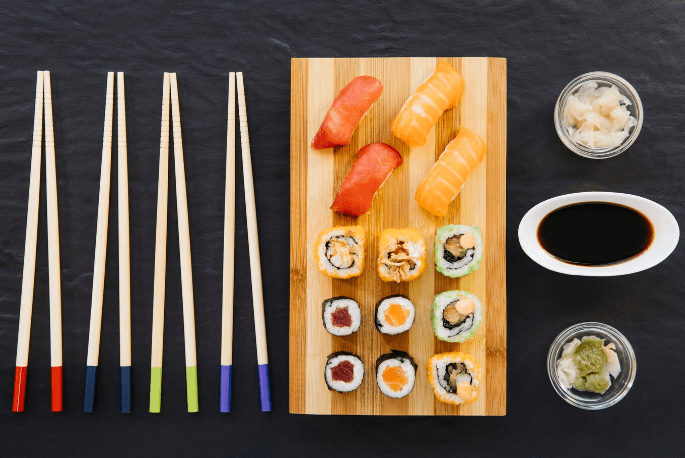Sushi as a source of high-quality protein and essential nutrients
A sushi dinner is not only a tasty treat, but it also holds the potential to provide you with a balanced diet of essential nutrients and protein. With so many options available, sushi has become an increasingly popular way to get in high-quality protein without sacrificing taste. In this blog post, we will explore the potential benefits of including sushi in your diet as a source of high-quality protein and essential nutrients. We’ll take a look at different types of fish used in sushi and discuss which are the most nutrient-rich. Finally, we’ll suggest some simple steps for incorporating this wholesome meal into your weekly routine.

The Nutritional Value of Sushi
Sushi is a delicious and healthy way to get your protein and essential nutrients. Made from fish or shellfish, sushi is a high-quality source of protein that is low in fat and calories. It is also an excellent source of omega-3 fatty acids, which are essential for heart health. Sushi is also a good source of vitamins and minerals, including vitamin B12, iron, and selenium.

High-quality protein from seafood
Protein is an essential macronutrient that plays a key role in many bodily functions. It is responsible for the growth and repair of tissues, the production of enzymes and hormones, and the transportation of nutrients throughout the body. Seafood is a rich source of high-quality protein, providing all the essential amino acids your body needs to function properly. In addition to being a great source of protein, seafood is also an excellent source of essential nutrients like omega-3 fatty acids, vitamin D, selenium, and iodine.
While there are many different types of seafood available, sushi is a great option if you’re looking for a high-quality protein source. Sushi is made with fresh fish that is typically very high in protein. For example, tuna sushi contains about 25 grams of protein per 6-piece roll. Salmon sushi contains even more protein, with about 30 grams per 6-piece roll. Not only is seafood sushi a great source of protein, but it’s also a very healthy option overall. It’s low in calories and saturated fat, and it’s a good source of heart-healthy omega-3 fatty acids.

Essential nutrients from rice, nori, and other ingredients
Rice, nori, and other sushi ingredients are excellent sources of high-quality protein and essential nutrients. Rice is a good source of carbohydrates and fiber, while nori is an excellent source of vitamins and minerals. Other sushi ingredients, such as fish, provide additional protein and essential nutrients.
Sushi is a nutrient-rich food that can provide many health benefits. It is a good source of high-quality protein, which is necessary for cell growth and repair. Sushi also contains essential nutrients, such as vitamins, minerals, and antioxidants. These nutrients are important for maintaining health and preventing chronic diseases.

Low-calorie and low-fat options
Sushi is a delicious and healthy option for those looking for a high-quality protein source. It is also low in calories and fat, making it a great option for those on a weight-loss or maintenance diet.
There are many different types of sushi, but some of the most popular options include: salmon, tuna, shrimp, and cucumber. Each of these ingredients is packed with protein and essential nutrients, while being low in calories and fat.
If you’re looking for a healthy and delicious way to get your daily protein intake, look no further than sushi!
Health Benefits of Sushi
Sushi is a nutritious and delicious way to enjoy seafood. It is often made with high-quality, lean protein sources such as tuna, salmon, and shrimp. Sushi can also be a good source of essential nutrients like omega-3 fatty acids, vitamin B12, and selenium.
While sushi has many health benefits, it is important to note that it can also be high in sodium and calories. If you are watching your sodium intake or calorie intake, be sure to check the nutrition information before ordering or making sushi at home.

Omega-3 fatty acids from seafood
Omega-3 fatty acids are essential nutrients that provide a wide range of health benefits. They can be found in seafood, such as salmon, tuna, and sardines. Omega-3 fatty acids from seafood are a good source of high-quality protein and essential nutrients, such as iron and vitamin D.
Seafood is a good source of protein and essential nutrients, such as omega-3 fatty acids, iron, and vitamin D. Salmon, tuna, and sardines are all excellent sources of omega-3 fatty acids. These nutrients provide a wide range of health benefits, including reducing the risk of heart disease and stroke.
Vitamins and minerals from fresh ingredients
Sushi is a great source of high-quality protein and essential nutrients, including vitamins and minerals. The fish used in sushi is a good source of vitamin A, vitamin B12, and omega-3 fatty acids. The rice used in sushi is a good source of thiamin, niacin, and magnesium. The seaweed used in sushi is a good source of iodine.
Sushi contains all the essential amino acids needed by the human body to build proteins. Sushi is also a good source of essential vitamins and minerals, including vitamin A, vitamin B12, niacin, magnesium, and iodine.(Different Types of Nigiri)
Antioxidants from vegetables and other ingredients
Sushi is a delicious and healthy way to get your protein and essential nutrients. But what about the antioxidants in sushi? Are they from the vegetables or other ingredients?
The answer is both! The vegetables used in sushi, such as cucumber, avocado, and pickled ginger, are rich in antioxidants. And many of the other ingredients used in sushi, such as fish and seaweed, also contain antioxidants.
So if you’re looking for a delicious and healthy meal that’s also high in antioxidants, sushi is a great option.
Comparison of nutritional value of different types of sushi
Sushi is a delicious and healthy option for a high-quality protein source. There are many different types of sushi, each with its own unique nutritional value. Here is a comparison of the nutritional value of different types of sushi:
Nigiri sushi is made with a small amount of rice and topped with fish or other seafood. It is a good source of protein, vitamin B12, and omega-3 fatty acids.
Maki sushi is made with rice and seaweed wrapped around fish or other fillings. It is a good source of protein, vitamins A and C, and iron.
Temaki sushi is a hand-rolled sushi made with rice and fish or other fillings in a cone shape. It is a good source of protein, vitamin B12, and omega-3 fatty acids.
Sashimi is thinly sliced raw fish or seafood. It is an excellent source of protein, omega-3 fatty acids, and vitamins B12 and D.
Conclusion
Sushi is a great source of high-quality protein and essential nutrients. Whether you are looking for a low-calorie meal or just want to make sure you get the recommended daily intake of vitamins and minerals, sushi should definitely be part of your diet. It can also be a delicious addition to any dinner party menu, so why not give it a try? With its fresh ingredients, creative presentation, and health benefits, sushi might just become one of your favorite dishes!





